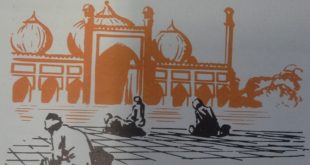Thirteen and a half centuries ago a new religion began in Arabia. Today millions of people are followers of this religion. It is called Islam and its followers, Moslems. All their lives long, Moslems must pray, in ways clearly prescribed, five times every day. No ordinary event must be allowed to interfere with these moments of prayer. Moslems must learn to recite their creed — a long statement of their religious belief. For one month each year they must fast all of every day from sunrise to sunset. They must give generously to charity. They should, if at all possible, …
Read More »Tag Archives: Hegira
Mohammed, Prophet of Allah A. D. 571 – 632
IN THE year 571, in Mecca, a boy was born in a humble household of the Quraysh. No one knows what name he was given. His father died before his birth and his mother when he was six. The orphan, boy now called Mohammed, was brought up by his grandfather. When his grandfather also died, he came into the care of his uncle, Abu Talib. Nothing definite is known about his early life. As a boy, he may have tended sheep at the edge of the desert outside the city. When he was old enough to ride a camel, he …
Read More »
